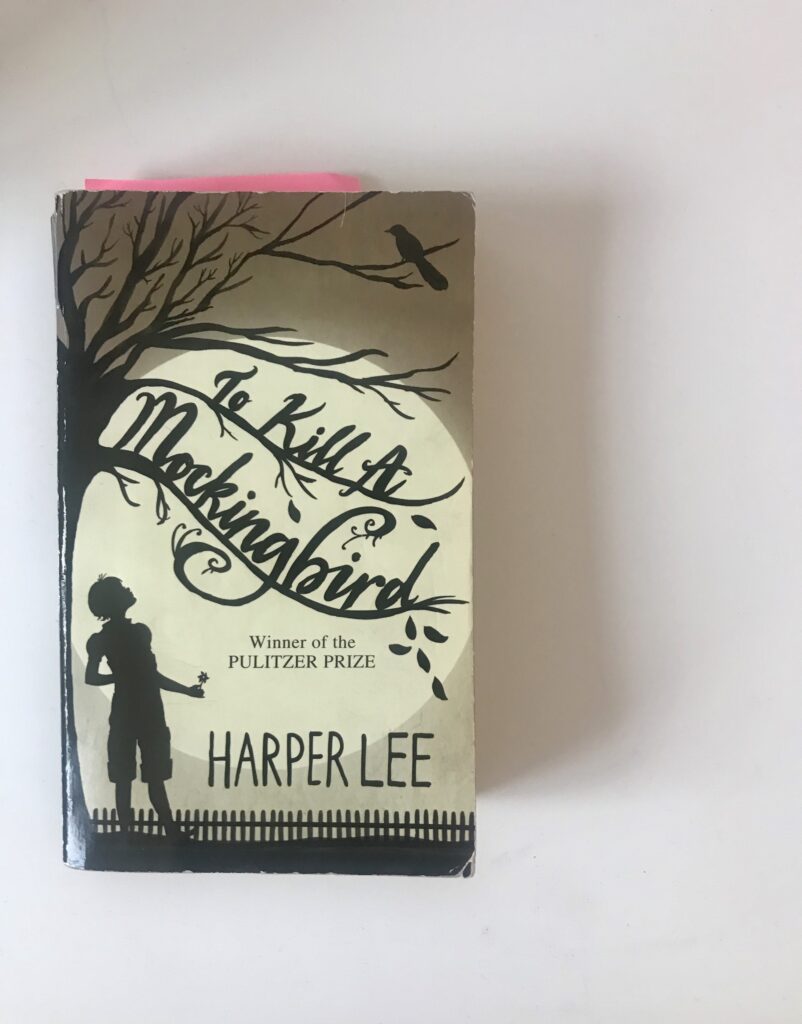For my Darling Files entry this month, I am sharing an essay I wrote as an example of a character analysis when I was teaching 8th grade English, and another one I wrote on the same character about 20 years later.
2004
I become nervous and tense when I think about Aunt Alexandra in To Kill A Mockingbird. This is because I can’t imagine having someone move into my home and not only tell me how to act, but conclude that the members of my family whom I love, don’t know what they’re doing. This is exactly what Alexandra does to Scout and her family. She literally moves herself into the Finch’s home and tries to take over.
Almost anyone who reads To Kill A Mockingbird loves Scout because of her tomboy nature and her independent spirit. Aunt Alexandra tries to break that as soon as she moves in. “We decided it would be best for you to have some feminine influence. It won’t be long before you become interested in boys.” Right away Aunt Alexandra assumes that Scout doesn’t have any female influences. She also thinks she knows what Scout will be interested in. I love Scout’s reply, even if it isn’t spoken outloud. “Cal’s a girl, it would be years before I would be interested in boys, I would never be interested in clothes.”
During a discussion about the book, an 8th grader asked, “Do you think Aunt Alexandra thinks or cares that she is being rude to Calpernia when she moves in and takes over?” After some time, the class decided that Alexandra has no regard for Calpurnia at all. To me, this is even worse than being deliberately rude. Alexandra doesn’t even give Calpurnia a thought, except to boss her around. “Put my bag in the front room, Calpurnia.” This is the first thing she says when Calpurnia and the children see her standing on their porch. Jem’s response, though subtle, makes a powerful point to Aunt Alexandra. “I’ll take it,” he says and lugs the heavy suitcase to the bedroom. I read this and see that while Aunt Alexandra may have no regard for Calpurnia, Jem does and isn’t going to let his aunt boss Calpurnia around.
It’s obvious Aunt Alexandra is racist, and believes that Calpurnia is “second best” to her. Aunt Alexandra is very upset that Jem and Scout went to church with Calpurnia, and when Scout asks Atticus (not Alexandra) if she can go to Calpurnia’s home, Aunt Alexandra says, “You may not.” Scout exchanges a few words with Alexandra and gets reprimanded for them. Aunt Alexandra tells Atticus he needs to “do something” about Calpurnia, and that she is no longer needed. Now it’s Atticus’ turn to tell Alexandra that she is in the wrong. “I don’t think the children have suffered one bit from her having brought them up.”
If anything, Aunt Alexandra made the Finch family stronger in her attempt to “remake” them. While I get annoyed with Alexandra every time I read the book, I know that in the end, she will lose. Despite the confusion and damage she causes, the Finch’s prove that the family is just fine, and Aunt Alexandra has to take her suitcase and go home.
2022
Except she doesn’t go home. The circumstances were such that she had to stay, or wanted to stay, or given the character sketch analysis above – which is true – believed she was needed. Alexandra was needed, though nobody knew it until devastation struck, and it was her particular skill set – that of the gracious hostess with impeccable etiquette – that allowed Atticus and Calpurnia to do the brutal work the two of them had to do.
I heard once, that upon learning that Harper Lee won the Pulitzer Prize for To Kill A Mockingbird, Flannery O’Connor said something like, “I wonder if they all know this is just a children’s book.” Whenever I think of this story now, I wonder what Ms. O’Connor would’ve done to make it not a children’s book. Probably Aunt Alexandra would’ve been gored by a bull or shot in the face by a Misfit. Dill would’ve done it, maybe? No, it would’ve been Scout. “I said I wasn’t wearin’ no darn dresses!” And then, “BANG! BANGITY BANG BANG BANG!”
Instead, Aunt Alexandra is hosting a ladies tea when Atticus Finch comes home early from work, apologizing and asking if Alexandra can meet him in the kitchen. It is here she learns along with Calpurnia, Miss Maudie, and Scout that Tom Robinson has been shot and killed.
Atticus and Calpurnia leave to tell Helen Robinson that her husband is dead, leaving Aunt Alexandra with her face in her hands and Miss Maudie “breathing as if she’d just climbed steps.” In a short rant that shows how much she cares for her brother, and his well-being (and sheds a slant of light on her motives in the prior analysis), Alexandra asks when this is going to end. “What else do they want from him, Maudie, what else?”
Alexandra is hysterical at this point and Maudie tells her to calm down, and then says, “Whether Maycomb knows it or not, we’re paying the highest tribute we can pay a man. We trust him to do right.”
Due to sexism, racism, geography, and the historical period, Alexandra, Miss Maudie, and Calpurnia can’t do the work Atticus is doing, but here, Miss Maudie points what they can do, what Atticus needs them to do to help bear with him the work he needs to do. Calpurnia goes with Atticus to tell Helen tragic news – a task Alexandra and Miss Maudie could never do. Maudie tells Alexandra to stand up, brush out the wrinkles in her skirt, and opens the door to where the ladies are chattering happily. The two of them join in on the chatter, refill coffee, and pass out treats. This is not a superficial move. It is necessary. Alexandra and Maudie must keep the facade of order in the hopes that the world will be re-ordered.
Scout sees all of this and at the end of the scene she makes eye contact with her aunt who previously has gotten on her last nerve. Now, she sees the courage in what Alexandra is doing. Scout picks up a tray of cookies and offers them to the company she must keep. “After all,” Scout reflects, “if Aunty could be a lady at a time like this, so could I.”
I’d like to know what made Flannery O’Connor decide this was a children’s book. Is it Boo Radley? Is it that the book is written from a child’s point of view? Or is it Lee’s ability to make us see a shred of humanity in every character in the book – even the most evil – and in turn hope to see that humanity in the world?
Is it only children who believe that?
Share your Darlings this week! Details here.



Leave a Reply